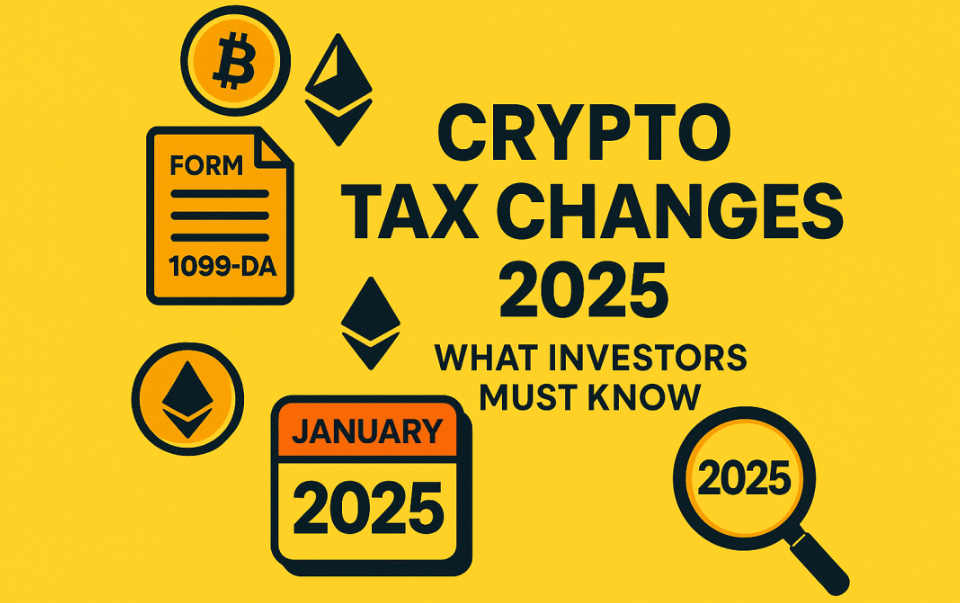The year 2025 brings significant developments in crypto tax regulations, particularly in the United States, aiming to enhance transparency and compliance. Investors need to be aware of these changes to avoid penalties and accurately report their digital asset activities.
Here’s a detailed breakdown of what every crypto investor should know for Crypto Taxes 2025:
Key Principles of Crypto Taxation in 2025

The IRS continues to treat cryptocurrency as property for tax purposes, not currency. This means that general property tax principles apply. Most crypto transactions will fall into one of two categories:
-
Capital Gains Tax: This applies when you sell, trade, or otherwise dispose of your crypto for a profit.
- Short-term Capital Gains: If you held the crypto for one year or less, your profit is taxed at your ordinary income tax rates (which can range from 10% to 37% in the US).
- Long-term Capital Gains: If you held the crypto for more than one year, your profit is taxed at more favorable long-term capital gains rates (0%, 15%, or 20% in the US, depending on your income bracket).
- Losses: If you sell crypto at a loss, you can typically use these losses to offset capital gains and potentially a limited amount of ordinary income through tax-loss harvesting.
-
Income Tax: This applies when you earn crypto through various activities, such as:
- Mining: The fair market value of mined crypto at the time you receive it is considered ordinary income.
- Staking Rewards: Similar to mining, staking rewards are taxable as ordinary income at their fair market value when you gain control over them.
- Airdrops: In most cases, airdropped crypto is treated as ordinary income at its fair market value upon receipt.
- Receiving Crypto as Payment: If you receive crypto as payment for goods, services, or as a salary, it’s considered ordinary income.
Important Changes and Reporting Requirements for 2025
Several crucial changes are taking effect for the 2025 tax year (which you’ll report in early 2026):
- Introduction of Form 1099-DA: This is a major change. Starting January 1, 2025, cryptocurrency exchanges, payment processors, and hosted wallet providers (considered “brokers” by the IRS) must report digital asset sales and exchanges to the IRS on the new Form 1099-DA.
- For the 2025 tax year, this form will primarily report gross proceeds from sales.
- For the 2026 tax year, brokers will also be required to report cost basis information.
- This significantly increases transparency and makes it easier for the IRS to identify unreported crypto transactions.
- Mandatory “Wallet-by-Wallet” Accounting (Effective Jan 1, 2025): Previously, investors might have used a universal accounting method to calculate cost basis across all their crypto holdings. However, starting in 2025, you must use a wallet-by-wallet method. This means you need to track the cost basis for crypto held in each individual wallet or exchange account.
- Cost Basis Calculation Methods (Temporary Relief): While the intent is to move towards mandatory FIFO (First-In, First-Out) for cost basis calculation, for the 2025 tax year, taxpayers can still choose from various identification methods like FIFO, LIFO (Last-In, First-Out), or Specific Identification. However, brokers are not yet required to support these various methods, so you’ll still need to track this accurately yourself.
- IRS Digital Asset Question on Tax Forms: The IRS continues to ask all taxpayers on Forms 1040, 1040-SR, 1040-NR, etc., whether they engaged in any digital asset transactions during the year. It’s crucial to answer this question accurately.
- Real Estate Transactions with Digital Assets: Starting in 2025, real estate entities must report digital assets used as payment in property transactions on Form 1099-S, along with fair market value details.
- Decentralized Finance (DeFi) Broker Reporting (Delayed): The mandatory broker reporting requirement for certain DeFi participants (originally set for 2027) was repealed by a Senate resolution in March 2025. This means that while centralized exchanges will report, DeFi platforms are currently exempt from third-party reporting requirements until at least 2027. However, this does NOT exempt individuals from reporting their gains and losses from DeFi activities. You are still fully responsible for tracking and reporting these transactions.
Taxable vs. Non-Taxable Crypto Events
Taxable Events:
- Selling crypto for fiat currency (e.g., USD).
- Trading one cryptocurrency for another.
- Using crypto to pay for goods or services.
- Receiving crypto as income (e.g., mining rewards, staking rewards, airdrops, payment for work).
- Converting crypto to NFTs or vice versa.
Non-Taxable Events:
- Buying crypto with fiat currency.
- Holding crypto (even if its value increases).
- Transferring crypto between your own wallets or accounts.
- Gifting crypto within the annual gift tax exclusion limit ($19,000 per recipient for 2025).
- Donating crypto to a qualified charity.
- Using crypto as collateral for a loan (unless the lender seizes the crypto).
How to Report Crypto on Your Taxes
- Gather all transaction records: This is paramount. You need a detailed history of every crypto transaction, including dates, amounts, types of transactions (buy, sell, trade, receive), and the fair market value in USD at the time of each transaction. This can be challenging across multiple exchanges and wallets, so many investors utilize crypto tax software.
- Determine your cost basis: This is the original value of your crypto investment, including purchase price and any fees. Accurate cost basis is essential for calculating gains and losses.
- Calculate capital gains/losses: Subtract your cost basis from the fair market value at the time of sale, trade, or use to determine your gain or loss for each taxable event.
- Complete the necessary tax forms:
- Form 1040 (or 1040-SR, 1040-NR): The primary form for general income reporting.
- Schedule D (Form 1040): Used to report capital gains and losses from the sale or exchange of property, including crypto.
- Form 8949: This form provides detailed information for each individual cryptocurrency transaction that resulted in a capital gain or loss. You’ll then transfer the totals to Schedule D.
- Schedule C (Form 1040): For self-employed individuals reporting income from crypto-related activities like mining or staking. This may also be subject to self-employment tax.
- Schedule 1 (Form 1040): To report other types of crypto income, such as airdrops or interest.
- Form 1099-DA: This new form will be issued by brokers and exchanges, and you should use it to reconcile with your own records.
Tax Planning Tactics for Crypto Investors
- Hold for the long term (HODL): This is a primary strategy to qualify for lower long-term capital gains tax rates.
- Tax-loss harvesting: If you have crypto investments that have declined in value, you can sell them to realize a capital loss. These losses can offset capital gains and up to $3,000 of ordinary income per year.
- Donate or gift crypto: Donating appreciated crypto to a qualified charity can allow you to deduct its fair market value from your taxable income, potentially avoiding capital gains tax on the appreciation. Gifting crypto within the annual exclusion limits (e.g., $19,000 for 2025) is generally tax-free for both the giver and recipient.
- Consider self-employed deductions: If you earn crypto as a self-employed individual (e.g., professional miner), you may be eligible for various business deductions related to your crypto activities.
- Pay estimated taxes: If you anticipate owing a significant amount of tax from your crypto activities, you may need to make estimated tax payments throughout the year to avoid underpayment penalties.
Global Crypto Tax Landscape
While the above primarily focuses on US tax laws, it’s important to recognize that crypto tax regulations are evolving globally. Many countries are implementing frameworks to tax digital assets, often categorizing them similarly to property or income. The European Union’s Markets in Crypto-Assets Regulation (MiCAR) is a significant development aiming to create a harmonized regulatory framework. Other countries, like India, have implemented flat taxes and TDS (Tax Deducted at Source) on crypto transactions. Some jurisdictions are also emerging as crypto-friendly tax havens, though investors must always consider their home country’s tax obligations.
In summary, 2025 marks a new era of increased scrutiny and formal reporting for crypto investors. Accurate record-keeping, understanding taxable events, and utilizing appropriate tax forms are more critical than ever. Consulting with a tax professional experienced in cryptocurrency can help navigate these complex regulations and ensure compliance.
Conclusion
As we move further into 2025, the landscape of crypto taxation is undeniably shifting towards greater transparency and stricter enforcement. For every investor, the overarching message is clear: proactive and meticulous record-keeping is no longer optional, but essential.
The introduction of Form 1099-DA marks a significant turning point, requiring centralized exchanges and brokers to report your transactions directly to the IRS. This eliminates much of the previous ambiguity and places the onus squarely on investors to ensure their reported activities align with official records. Furthermore, the mandatory wallet-by-wallet accounting for cost basis underscores the need for granular detail in tracking your crypto holdings.
While the complexities of DeFi taxation are still evolving and certain reporting requirements for decentralized platforms have been delayed, it’s crucial to remember that your individual responsibility to report gains and losses from all crypto activities, regardless of platform, remains unchanged.
Ultimately, navigating crypto taxes in 2025 requires vigilance, a thorough understanding of what constitutes a taxable event (from sales and trades to mining and staking rewards), and the diligent application of relevant tax forms. Leveraging specialized crypto tax software or consulting with a tax professional experienced in digital assets can be invaluable tools to ensure compliance, optimize your tax strategy, and avoid potential penalties in this increasingly regulated environment. The era of casual crypto investing with minimal tax consideration is rapidly fading; informed and disciplined tax planning is now a cornerstone of successful digital asset management.
Ready to start your cryptocurrency journey?
If you’re interested in exploring the world of crypto trading, here are some trusted platforms where you can create an account:
🔹 Binance – A global leader in cryptocurrency trading.
🔹 Bybit – A user-friendly platform for both beginners and advanced traders.
These platforms offer innovative features and a secure environment for trading and learning about cryptocurrencies. Join today and start exploring the opportunities in this exciting space!
🚀 Want to stay updated with the latest insights and discussions on cryptocurrency?
Join our crypto community for news, discussions, and market updates: OCBCryptoHub on Telegram.
📩 For collaborations and inquiries: datnk710@gmail.com
Disclaimer: Always do your own research (DYOR) and ensure you understand the risks before making any financial decisions.




